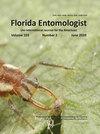Defensive Warning Behavior Expressed by Three Species of Polistine Wasps
IF 1.2
4区 农林科学
Q3 ENTOMOLOGY
引用次数: 0
Abstract
Abstract Although expressions of warning intruders in colonies of polistine wasps appear to vary somewhat with species-specific defensiveness, the type of intrusion, age of the colony, age and type of the nest occupants, and degree of colony homeostasis, they often share commonly expressed forms of behavior when warning both invertebrate and vertebrate intruders in the vicinity of the nest site. Warning behavior is not associated with most of the home range but with a nest yard, an area within visual range of the nest. The distance from the nest at which stinging is demonstrated is defined as a sting threshold point, which varies among different species and at different periods in the annual cycle. Aposematic coloration and pattern, expressed to varying degrees in different species and sexes, are demonstrated passively but play an active role in defense when combined with warning displays. While males do not engage in active defense, they play a more passive defensive role, and sometimes possess stronger aposematic patterns than those of females. They also engage in a low degree of overt warning expressions. Resumen Mientras que las expresiones de advertencia en las colonias de avispas polistinas parecen variar algo con actitudes defensiva propias de cada especie, el tipo de intrusión, edad de la Colonia, edad y tipo de ocupantes del nido y el grado de homeostasis de la colonia, a menudo comparten formas comunes de comportamiento de advertencia ante intrusos que se acerquen al nido ya sean invertebrados o vertebrados. El comportamiento de advertencia no está asociado con la mayoría del área de vida (home range) sino con el “patio del nido,” la adyacencia inmediata visual al nido. La distancia del nido a la cual puede suceder la picadura se define como el umbral de la picaura, la cual varía entre diferentes especies y en diferentes períodos del ciclo anual. Coloración aposemática y patrón, expresado en diversos grados en diferentes especies y sexos, se manifiestan pasivamente, pero juegan un papel activo en la defensa cuando se combina con el comportamiento agonístico. Aunque los machos no participan en la defensa activa, ellos juegan un papel defensivo pasivo y a menudo poseen patrones aposemáticos más fuertes que los de las hembras. También participan en bajo grado en manifiestas expresiones de advertencia.三种寄生蜂的防御预警行为
摘要虽然在波兰黄蜂殖民地中警告入侵者的表达似乎有所不同,但有些东西具有特定的防御能力、入侵类型、殖民地年龄、巢穴占用者的年龄和类型以及殖民地稳态的程度,但当在巢穴附近警告无脊椎动物和脊椎动物入侵者时,它们往往共享共同表达的行为形式。警告行为与大多数家庭范围无关,而是与巢穴庭院有关,巢穴视觉范围内的区域。与表明刺入的巢穴的距离被定义为刺入阈值,该阈值在年度周期的不同物种和不同时期各不相同。天启色彩和图案在不同物种和性别中表现出不同程度的变化,被被动地表现出来,但与警告显示相结合,在防御中发挥着积极作用。虽然男性不参与主动防御,但他们发挥着更被动的防御作用,有时比女性具有更强的末日模式。他们还参与了较低程度的过度警告表达。摘要虽然Polistina黄蜂殖民地的警告表达似乎因每个物种特有的防御态度、入侵类型、殖民地年龄、巢穴占用者的年龄和类型以及殖民地的稳态程度而有所不同,但它们往往对接近巢穴的入侵者有共同的警告行为形式,无论是无脊椎动物还是脊椎动物。警告行为与大多数生活区(家庭范围)无关,而是与“巢穴庭院”有关,即巢穴的视觉直接相邻。与可能发生咬伤的巢穴的距离被定义为咬伤阈值,该阈值在不同物种之间和年度周期的不同时期有所不同。凋亡色彩和模式在不同物种和性别中不同程度地表达,它们被动地表现出来,但与痛苦行为相结合时,它们在防御中发挥着积极作用。虽然雄性不参与主动防御,但它们起着被动防御的作用,通常具有比雌性更强的凋亡模式。他们还很少参与明显的警告表达。
本文章由计算机程序翻译,如有差异,请以英文原文为准。
求助全文
约1分钟内获得全文
求助全文
来源期刊

Florida Entomologist
生物-昆虫学
CiteScore
2.10
自引率
7.10%
发文量
44
审稿时长
3 months
期刊介绍:
Florida Entomologist is the official journal of the Florida Entomological Society. Volumes 1-3 were published under the name The Florida Buggist. The Florida Entomological Society still produces the traditionally printed version of Florida Entomologist, but you can also view, search, or print any article published since June 1917 by accessing online files. Web access is made possible by the Society’s electronic publication project begun in 1993
 求助内容:
求助内容: 应助结果提醒方式:
应助结果提醒方式:


